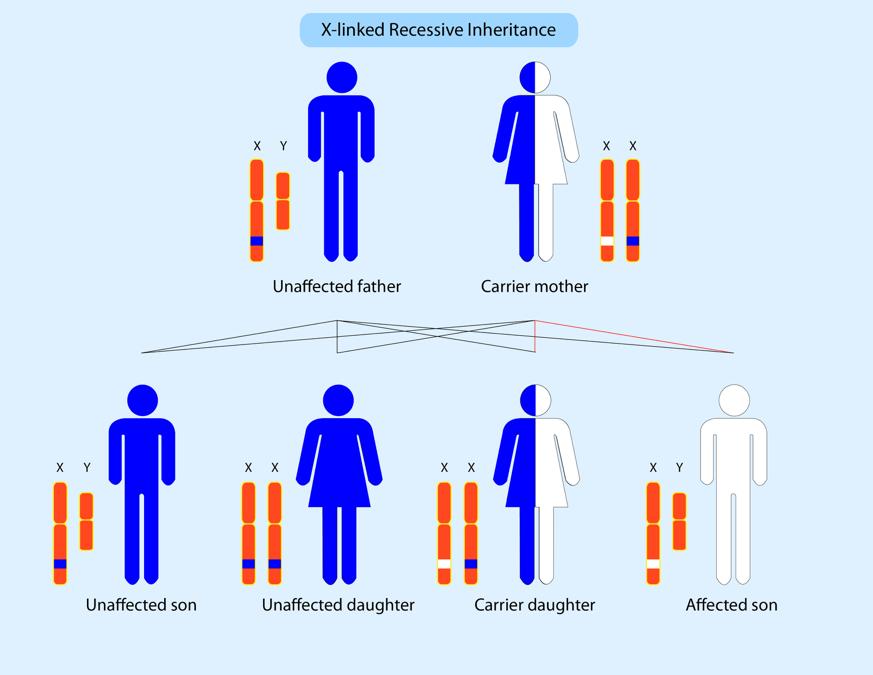Carrier Inheritance
What is a Carrier?
A carrier is a person who “carries” a genetic mutation in any of their genes that could be passed on to their children. Because the mutation for Duchenne is found on the X chromosome, only females can be carriers for the mutation on the gene that encodes for dystrophin protein. Carriers have an increased chance of having sons with Duchenne and daughters who are carriers.
Carriers can have some symptoms of Duchenne, such as muscle weakness and cardiomyopathy. Though it is rare, some females can have the classic symptoms of Duchenne, and they are known as manifesting carriers. All carriers should be evaluated by a healthcare provider familiar with Duchenne.
A carrier can include:
- females who have a child or children with Duchenne
- females who have close family members with Duchenne
- females who have symptoms of Duchenne
- females who have no family history of Duchenne and no symptoms of Duchenne
It is important to remember that Duchenne is not always inherited from a carrier mother. Approximately 70% (2 out of 3) of children born with Duchenne have inherited the genetic mutation from their mother who is a carrier. However, approximately 30% (1 out of 3) of children born with Duchenne have a genetic change that started new in them and was not inherited from their mother. This is called a “spontaneous mutation” or a “de novo” mutation. The mother of a child with a spontaneous mutation is not a carrier.
How is Duchenne passed through carriers?

This illustration shows how the mutation that causes an X-linked disorder can pass from a carrier woman to her children. As you can see, a carrier mother may or may not pass on the gene with the mutation—there is an equal chance each way.
Each time a carrier mother has a son, there is a 50% chance (or 1 out of 2) that he will be affected with Duchenne, and each time a carrier mother has a daughter, there is a 50% chance (or 1 out of 2) that she will be a carrier. Carriers have no control over which copy of their X chromosome they pass on to their children.
How is Duchenne passed through germline mosaic carriers?
If you have a child with Duchenne and you have had negative carrier testing, your doctor or genetic counselor may have mentioned the chance of germline mosaicism. Please read our section on Germline Mosaic Carriers to learn more.
A woman has a child with Duchenne. How likely is it that she is a carrier?
- If a female has a child with Duchenne or Becker, and she has other affected male family members (such as an affected brother or nephew), it is extremely likely that she is a carrier.
- If a female has a child with Duchenne or Becker, and there are no other affected family members, there is a 70% (⅔ or 2 in 3) chance that she is a carrier. Approximately 30% (⅓ or 1 in 3) of children born with Duchenne have a genetic change that started new in them and was not inherited from their mother. This is called a “spontaneous mutation” or a “de novo” mutation. The mother of a child with a spontaneous mutation is not a carrier.
The possibility for new mutations is one of the reasons why 1/3 or more of individuals with Duchenne will have no family history. Another possibility is that some families have several generations with mostly or all females (that is, they have no boys to express the disease). These families may not know that there are several generations of carriers.
What is the chance of Duchenne happening again in a family?
- If a woman is a carrier, each time a carrier has a son, there is a 50% chance (or 1 out of 2) that he will be affected with Duchenne, and each time a carrier has a daughter, there is a 50% chance (or 1 out of 2) that she will be a carrier.
- If a woman has a son with Duchenne or Becker but her carrier testing was negative, she has likely been told about the chance of germline mosaicism. It is not known exactly how often germline mosaicism occurs in women with negative carrier testing, though some studies have suggested up to 15%. Women who may have germline mosaicism have a lower chance than a carrier to have children with Duchenne, but their chance is higher than the someone with no genetic predisposition. It is impossible to know the exact chance for a female with germline mosaicism to have another affected child because there is no way to tell how many of her egg cells have the dystrophin mutation. Learn more about germline mosaicism.
Once Duchenne has been diagnosed in a family, it is important for family members to talk with a genetic counselor. A genetic counselor will take a detailed family history and will determine what other females in the family are at risk to be carriers. Learn more about genetic counseling.
The only way to know for sure if a female is a carrier is by genetic carrier testing. However, carrier testing is much more accurate if the mutation is first confirmed in an affected relative. If you have a relative who needs genetic testing for Duchenne or Becker, please refer them to our Decode Duchenne program, which provides free genetic testing, interpretation, and counseling. Learn more about carrier testing.





